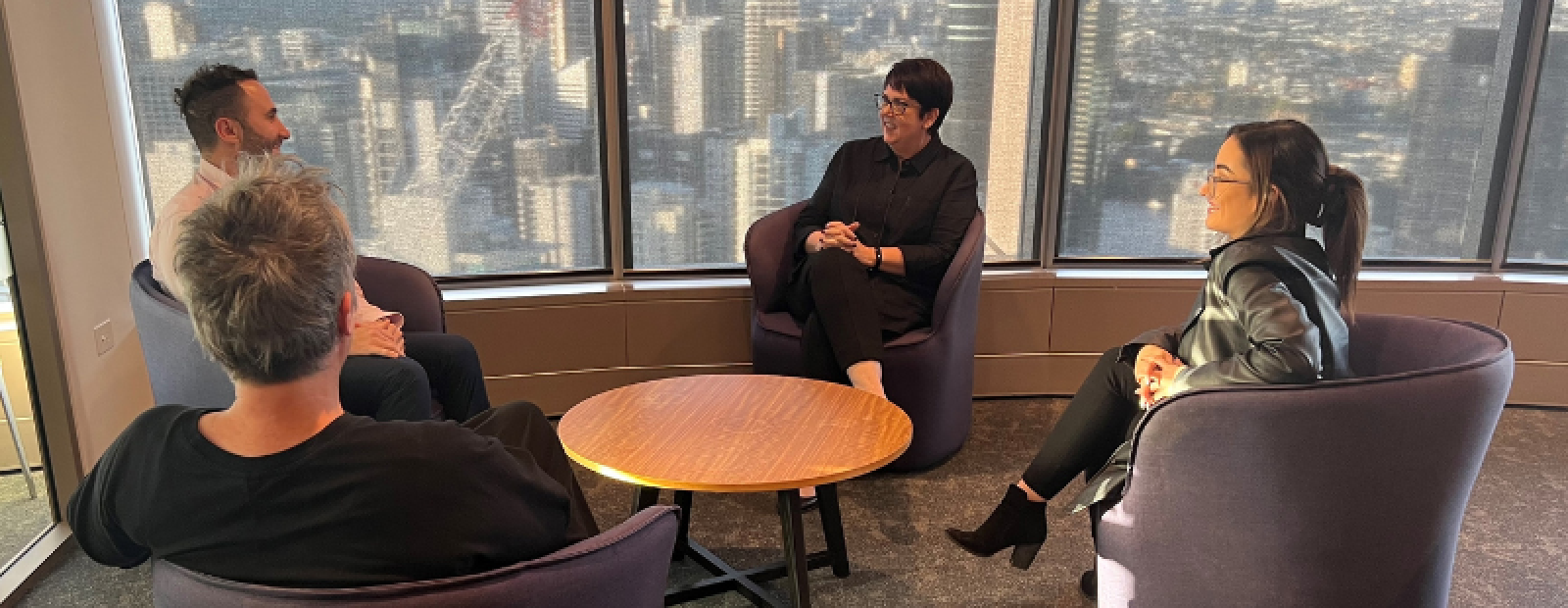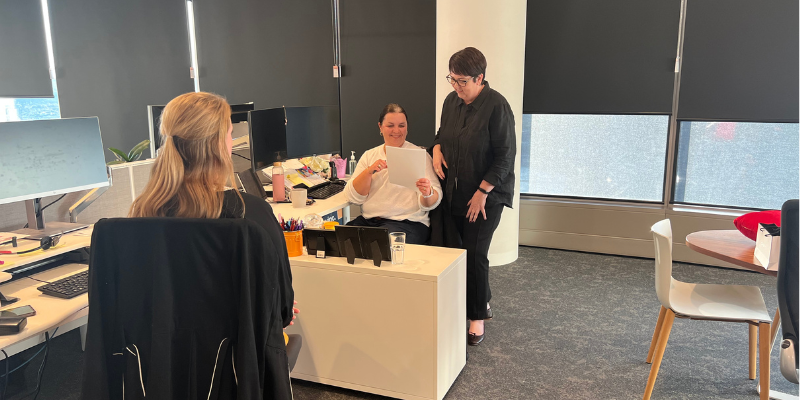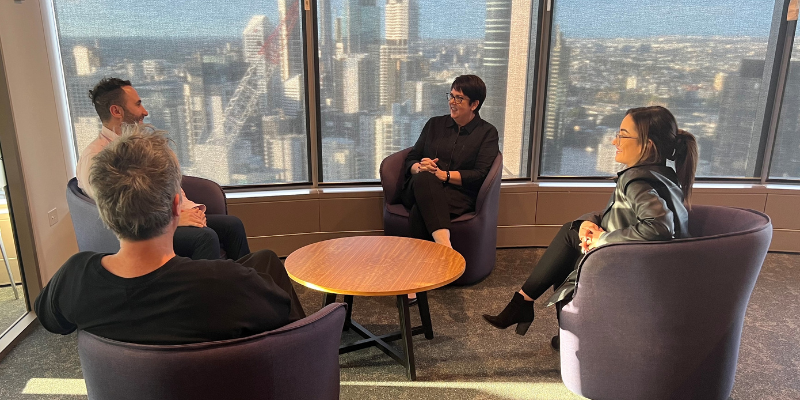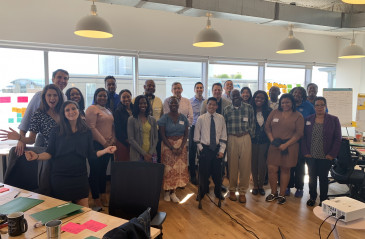
Curriculum Reform and Its Connection to the Black Lives Matter Movement


In this @CPI_foundation article, @theasnow talks to @DeidreMulkerin about her role as Director General of @ChildrenQld and her key messages about letting go of control, and sharing power
Share article“Our goal is to hold lightly our authority. We should hold it as lightly as we can and we should be walking alongside our partners and communities." @DeidreMulkerin from @ChildrenQld
Share article"The best that we can do is hold the intent, hold the relationship, hold each other in good regard, try and problem solve with good grace with each other." @DeidreMulkerin from @ChildrenQld
Share articleWe put our vision for government into practice through learning partner projects that align with our values and help reimagine government so that it works for everyone.
Deidre Mulkerin is the Director General of the Queensland Department of Children, Youth Justice and Multicultural Affairs. In this role, she is responsible for statutory child protection, young people who interact with the justice system, and multicultural affairs. There are approximately 5,500 staff in the Department, and it has a budget of around $1.8 billion.
I recently heard Deidre speak as part of the Leaders’ Panel at the BiiG Conference in Brisbane. Some of her key messages - particularly about letting go of control, and sharing power - resonated really strongly with the Centre for Public Impact’s vision for government. In Deidre, I heard a senior government executive saying that it is possible to chart a different course - to lead and work differently. I wanted to understand how she had created the permission space for herself to take some risks, to share control with communities, and to embrace uncertainty – particularly in an environment as politically fraught as child protection. So I decided to reach out to her to learn more.
This article captures some of the key themes we explored over the course of an hour-long conversation in early May.
In her role as Director General, Deidre is responsible for the implementation of a series of policy and legislative reforms which seek to strengthen the child protection and family support system in Queensland. Recent amendments to the Child Protection Act have enshrined in law the need for children to have a voice and participate in decisions about their lives. In addition, Deidre explained, the recent amendments “set really high expectations that we will honour and respect First Nations’ culture, decision making and self-determination.”
But while these legislative amendments set strong foundations for a new approach to child protection, Deidre and her department were charged with working out how to move from ideas to action - in other words, how to translate legislative intent into changes in how the work was happening on the ground.
One of the headline initiatives which is seeking to give life to these reforms is an agreement between Family Matters Queensland, the Queensland Aboriginal and Torres Strait Islander Child Protection Peak, and Deidre’s Department, which transitions child protection powers and functions to Aboriginal and Torres Strait Islander Community Controlled Organisations. This is a big shift, which requires not just new ways of doing things, but also new beliefs and mindsets from those involved in implementing the new approach.
So how is she going about getting this done? The answer to this starts with who Deidre is and what drives her.
Deidre began her working life as a frontline child protection youth justice worker, spending 38 years in the industry - “I've worked my way up and done most jobs - a lot of frontline jobs, a lot of knocking on doors, working with families, working with kids in court, then a lot of manager roles, too - managing and advising teams then leading and managing regions, some policy work, strategy work.”

For Deidre, the fact that she brings with her to this role deep, lived, subject matter expertise means that she is trusted by both the sector and politicians to steward these reforms which require substantial shifts in where power vests and whose voices are centred in decisions about children’s lives. However, Deidre also conceded that being a national expert is not enough. She explained that another key element of her leadership approach rests on “how I am in the role and how I go about doing the job.”
For Deidre to do her job well, she feels that it’s important to bring her whole self to the role. One way she does this is by circulating a weekly email to all staff, which reports not just on what is happening across the Department, but also on Deidre’s life. She includes something about books she’s reading, or something about her children or grandchildren. She also talks about mental health and, after losing her husband to cancer a couple of years ago, about grieving and loss. She explained,
“It's more about the message that, no matter who you are, we all have big lives and the run of our lives are often complicated. Everybody experiences joy and happiness and sadness, and everybody needs help from time to time. And there's no shame in saying that. So I take the opportunity in my regular emails to our staff to reinforce that.”
In order to capitalise on the space that the legislative and policy reforms opened up, Deidre explained that embracing change is critical. In particular, the Department needed to show courage in letting go of power and authority, and “giving space for traditional owners and elders and the community sector to step in to make decisions.”
Deidre went on to explain,
“Our goal is to hold lightly our authority. We should hold it as lightly as we can and we should be walking alongside our partners and communities. So it's quite a deliberate shift in language. It's a deliberate change in posture. It's honouring the wisdom and the expertise of our community control sector and our partners.”
This decision to share power is not driven by a sense of altruism; rather it is driven by Deidre’s firm belief that, “particularly for First Nations’ kids, the community is better placed to make decisions about their life course.”
This culture shift is also based on a spirit of service, which shapes how Deidre understands both her role, and the role of the Department. For Deidre, it is crucial that everyone across the Department understands their role as being to serve and support the frontline. This is how she sees her role, too:
“I always say my job as DG is to be in service of my colleagues who are on the frontline doing the work. So when I'm out and about and we're having conversations, I will say, how can I be of service to you? What do you need? How can I help you? What can I push out of the way to help you do the work?”
Another cultural shift that Deidre highlighted was the need to be comfortable embracing uncertainty and making mistakes.
I was fascinated by this observation, because this feels like the place I often get stuck. I explained to Deidre that when I talk about CPI’s ideas around sharing power and embracing uncertainty, people often say, “Thea, you know, we'd love to do this, but in high risk, highly scrutinised policy areas (like child protection!), it just isn’t possible.” What was her response to that?
“I mean, it's true. We are often considered by government to be the riskiest business that they're in. We are in the risk management business - we manage risk every minute of every day. And, yet, we are also in a highly contested space. You know, if you’ve got ten professionals in a room, you’d get ten different views about what was the right way to proceed. And in my mind, that just means it's ripe for lots of opportunity, because there's no precise science about it.”

Like so many of the innovators we speak to across the world, Deidre went on to explain that she didn’t seek permission to pursue the reforms “even though I didn’t have a fully mapped out plan.” She just did it: “we could have spent many years polishing a plan that, by the time we got to the end of the polish, would have been out of date. So I just made the call that we knew enough to start.”
However, she noted that she did make sure that her approach was fully aligned with the government’s policy position. So long as she could keep pointing to the fact that the government policy legislation was to move to self-determination, she felt comfortable drawing on her own expertise, as well as that of her colleagues and partners, to make decisions about how to apply that policy in practice.
Deirdre is also under no illusions about the fact that mistakes are inevitable and unfortunately a necessary part of the process.
“I explicitly said, ‘we are going to make mistakes at some point, not because we intend to get up in the morning and do the wrong thing, but we will make mistakes because we can't see it all.’ And we're actually kind of iterating as we go. So the best that we can do is hold the intent, hold the relationship, hold each other in good regard, try and problem solve with good grace with each other. And know that we are generally on a journey to get to a different place that we have agreed is the right place to get to.”
In addition, Deidre explained that, in a field like child protection, the fact that you can’t guarantee that a child will never be harmed is an uncomfortable reality, but one that we all need to accept. “It would be like asking a hospital to say every person who goes in comes out well… this is not the real world.” What is needed are appropriate controls and oversight, a commitment to learning and improving, and a deep conviction within government and its partners in First Nations’ communities and organisations, academia and the NGO sector that “the course of action is true and right.”
But how do you build that conviction amongst key partners that the course of action is right and true? Deidre explained that investing heavily in building relationships and trust. And key to this is humility.
As the Department and its partners have been collectively exploring ways to make real the principles outlined at Section 5B of the Act, mistakes have been made. Deidre explained that she herself has received some very direct feedback from partners, who explained why some of the Department’s decisions were wrong. In response to this, Deidre’s approach was not to try to justify or deny the mistake but rather to apologise:
“I had to eat humble pie. And just say, ‘I am so sorry. That is not what we intended, but I totally hear that. That’s how you’ve experienced it. Talk to me about how I can make this right. What do I need to look out for next time? Tomorrow we’ll get up and we will do our very best to do better and be better.’”
Another way Deidre and her colleagues are working to build trust is by deliberately inverting traditional norms around when and how First Nations’ voices are shaping these reforms. Instead of beginning with a mainstream program of work, and then tweaking it so that it is responsive to First Nations’ needs, Deidre and the team are working with partners to develop a plan which is First Nations’ first, and which will be adapted for the mainstream response. The power and symbolism in this shift is significant:
“We are just trying to find as many different ways as we can to change the dynamic and change the culture and change the language. Ultimately my hope is that we change the locus of control over time. If we can make all of these big shifts, the locus of control will actually change to the local community.”
Right now, a priority for Deidre is thinking about how to scale these reforms - how to make sharing power the norm, rather than something which is happening in a few places across Queensland: “How do we make this happen everywhere across the state?”
But she is also thinking about when will be the right moment for her to step back, and hand the baton to someone else. She is mindful that “I occupy a big space and it really has to be sustainable change; it can’t just be about me.”
While many people might look at a portfolio like Deidre’s and think about how challenging and grim it would all feel, Deidre sees it as a portfolio area full of possibility. She explained, “I've got a deep, binding passion and commitment for it, and a deep love of it, and a love of the possibility of it and the hope of it… I've been able to step into this moment in time when the sector and the department was hungry for a direction that was really about hope and promise and the future.”
It is this hope that drives her and inspires her every day. It is this sense of hope that makes the challenge of a role like this worthwhile.
And, from my perspective, having leaders like Deidre gives me hope too.






